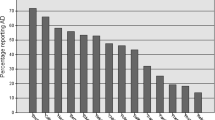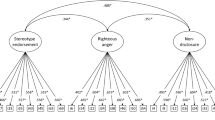Abstract
Purpose
Research suggests stereotype endorsement or self-stigma serves as a barrier to functioning and well-being among persons with schizophrenia. Little is known about how stable self-stigma is and whether it is linked over time with related constructs such as discrimination experiences and psychological distress.
Methods
Stereotype endorsement and discrimination experiences were assessed using the Internalized Stigma of Mental Illness Scale and psychological distress was assessed using the Emotional Discomfort component of the Positive and Negative Syndrome Scale, at three points in time across 1 year.
Results
Path analyses indicated that the constructs of stereotype endorsement and discrimination experiences are stable over periods of 5–7 months and may fluctuate over 12 months. Further, the constructs of stereotype endorsement and discrimination experiences were related to one another concurrently, but analyses failed to detect a relationship over time. Neither construct was related to psychological distress over time.
Conclusions
Self-stigma is a stable construct in the short term, and is distinct from related constructs such as discrimination experiences and psychological distress.


Similar content being viewed by others
References
Angermeyer MC, Matschinger H (2003) The stigma of mental illness: effects of labeling on public attitudes towards people with mental disorder. Acta Psychiatr Scand 108:304–309
Swindle R, Heller K, Pescosolido BA, Kikuzawa S (2000) Responses to nervous breakdowns in America over a 40-year period: mental health policy implications. Am Psychol 55(7):740–749
Markowitz FE (1998) The effects of stigma on the psychological well-being and life satisfaction of persons with mental illness. J Health Soc Behav 39:335–347
Phelan JC, Link BG, Stueve A, Pescosolido BA (2000) Public conceptions of mental illness in 1950 and 1996: what is mental illness and is it to be feared? J Health Soc Behav 41(2):188–207
Magliano L, Read J, Marassi R (in press) Metaphoric and non-metaphoric use of the term “schizophrenia” in Italian newspapers. Soc Psychiatry Psychiatr Epidemiol
Link BG, Phelan JC (2001) Conceptualizing stigma. Ann Rev Sociol 27(1):363
Martin JK, Pescosolido BA, Tuch SA (2000) Of fear and loathing: the role of disturbing behavior, labels and causal attributions in shaping public attitudes toward persons with mental illness. J Health Soc Behav 41(2):208–233
Leiderman EA, Vazquez G, Berizzo C, Bonifacio A, Bruscoli N, Capria JI, Ehrenhaus B, Guerrero M, Guerrero M, Lolich M, Milev R (in press) Public knowledge, beliefs and attitudes towards patients with schizophrenia: Buenos Aires. Soc Psychiatry Psychiatr Epidemiol
Cechnicki A, Angermeyer MC, Bielańska A (in press) Anticipated and experienced stigma among people with schizophrenia: its nature and correlates. Soc Psychiatry Psychiatr Epidemiol
Link BG, Cullen F, Struening EL, Shrout PE, Dohrenwend BP (1989) A modified labeling theory approach to mental disorders: an empirical assessment. Am Sociol Rev 54:400–423
Link BG, Struening EL, Neese-Todd S, Asmussen S, Phelan JC (2001) The consequences of stigma for the self-esteem of people with mental illness. Psychiatr Serv 52:1621–1626
Lally SJ (1989) Does being in here mean there is something wrong with me? Schizophr Bull 15:253–265
Ritsher JB, Otilingam PG, Grajales M (2003) Internalized stigma of mental illness: psychometric properties of a new measure. Psychiatr Res 121:31–49
Warner R, Taylor D, Powers M, Hyman R (1989) Acceptance of the mental illness label by psychotic patients: effects on functioning. Am J Orthopsychiat 59:389–409
Wright ER, Gronfein WP, Owens TJ (2000) Deinstitutionalization, social rejection and the self esteem of former mental patients. J Health Soc Behav 41:68–90
Yanos PT, Roe D, Lysaker PH (in press) The impact of illness identity on recovery from severe mental illness. Am J Psychiatric Rehabil
Siris SG (2001) Suicide and schizophrenia. J Psychopharmacol 15:127–135
Freudenreich O, Cather C, Evins AE, Henderson DC, Goff DC (2004) Attitudes of schizophrenia outpatients towards psychiatric medications: relationship to clinical variables and insight. J Clin Psychiat 65(10):1372–1376
Katschnig H (2000) Schizophrenia and quality of life. Acta Psychiatr Scand 102:33–37
Lloyd C, Sullivan PL, Williams D (2005) Perceptions of social stigma and its effect on interpersonal relationships of young males who experience a psychotic disorder. Aust Occup Ther J 52(3):243–250
Lysaker PH, Roe D, Yanos PT (2007) Toward understanding the insight paradox: internalized stigma moderates the association between insight and social functioning, hope and self-Esteem among people with schizophrenia spectrum disorders. Schizophr Bull 33:192–199
Rüsch N, Corrigan PW, Wassel A et al. (2009) Self-stigma, group identification, perceived legitimacy of discrimination and mental health service use. Br J Psychiatry 195(6):551–552
Ertugrul A, Ulug B (2004) Perception of stigma among patients with schizophrenia. Soc Psych Psych Epid 39(1):73–77
Lysaker PH, Davis LW, Warman DM, Strasburger A, Beattie N (2007) Stigma, social function and symptoms in schizophrenia and schizoaffective disorder: associations across six months. Psychiatr Res 149:89–95
Yanos PT, Roe D, Markus K, Lysaker PH (2008) Pathways between internalized stigma and outcomes related to recovery in schizophrenia-spectrum disorders. Psychiatr Serv 59:1437–1442
Lysaker PH, Tsai J, Yanos P, Roe D (2008) Associations of multiple domains of self-esteem with four dimensions of stigma in schizophrenia. Schizophr Res 98:194–200
Yanos PT, Rosenfield S, Horwitz A (2001) Negative and supportive social interactions and quality of life among persons diagnosed with severe mental illness. Community Mental Health J 37:405–419
Dickerson FB, Sommerville J, Origoni AE, Ringel NB, Parente F (2002) Experiences of stigma among outpatients with schizophrenia. Schizophr Bull 28:143–155
Lundberg B, Hansson L, Wentz E, Björkman T (2009) Are stigma experiences among persons with mental illness, related to perceptions of self-esteem, empowerment and sense of coherence? J Psychiatr Mental Health Nurs 16(6):516–522
Lundberg B, Hansson L, Wentz E, Björkman T (2007) Sociodemographic and clinical factors related to devaluation/discrimination and rejection experiences among users of mental health services. Soc Psychiatry Psychiatr Epidemiol 42(4):295–300
Spitzer R, Williams J, Gibbon M, First M (1994) Structured clinical interview for DSM IV. Biometrics Research, New York
Kay SR, Fizsbein A, Opler LA (1987) The positive and negative syndrome scale for schizophrenia. Schizophr Bull 13:261–276
Bell MD, Lysaker PH, Goulet JB, Milstein RM, Lindenmayer JP (1994) Five-component model of schizophrenia: assessing the factorial invariance of the PANSS. Psychiatr Res 52:295–303
Davis L, Lysaker PH, Lancaster RS, Bryson GJ, Bell MD (2005) The Indianapolis Vocational Intervention Program: a cognitive behavioral approach to addressing rehabilitation issues in schizophrenia. J Rehabil Res Dev 42:35–46
Jöreskog KG, Sörbom D (2006) LISREL (Version 8.8) [Computer software]. Scientific Software International, Chicago
Keith TZ (2006) Multiple regression and beyond. Allyn & Bacon, Boston
Byrne BM (1998) Structural equation modeling with LISREL, PRELIS, and SIMPLIS: Basic concepts, applications, and programming. Lawrence Erlbaum Associates, Mahwah
Enders CK (2001) The performance of the full information maximum likelihood estimator in multiple regression models with missing data. Educ Psychol Meas 61:713
Kline RB (1998) Principles and practice of structural equation modeling, 2nd edn. Guilford Press, New York
Lysaker PH, Glynn SM, Wilkness SM, Silverstein SM (2010) Psychotherapy and recovery from schizophrenia: a review of potential application and need for future study. Psychol Serv 7(2):75–91
Roe D, Hasson-Ohayon I, Derhy O, Yanos PT, Lysaker PH (2010) Talking about life and finding solutions to different hardships: a qualitative study on the impact of Narrative Enhancement and Cognitive Therapy on persons with serious mental illness. J Nerv Ment Dis 198(11):807–812
Yanos PT, Roe D, Lysaker PH (in press) Narrative enhancement and cognitive therapy: a new group-based treatment for internalized stigma among persons with severe mental illness. Group Psychother
Acknowledgment
This research was funded by a grant from the VA Rehabilitation Research and Development Service.
Conflict of interest
The authors have no conflict of interest to declare.
Author information
Authors and Affiliations
Corresponding author
Rights and permissions
About this article
Cite this article
Lysaker, P.H., Tunze, C., Yanos, P.T. et al. Relationships between stereotyped beliefs about mental illness, discrimination experiences, and distressed mood over 1 year among persons with schizophrenia enrolled in rehabilitation. Soc Psychiatry Psychiatr Epidemiol 47, 849–855 (2012). https://doi.org/10.1007/s00127-011-0396-2
Received:
Accepted:
Published:
Issue Date:
DOI: https://doi.org/10.1007/s00127-011-0396-2




